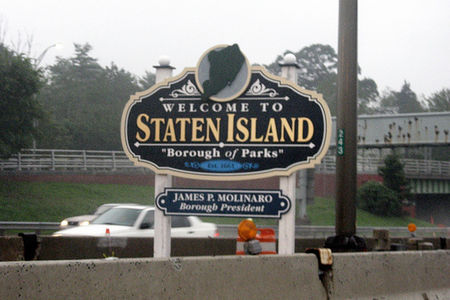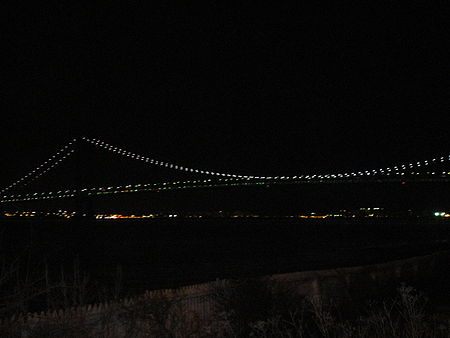User:Christina.VicidominiFrom The Peopling of New York City
Introduction & StatisticsMigration. This is something that has been occurring since the beginning of time. Most of these relocation movements occurred over vast amounts of land for vital reasons. But, what causes people to move to a new area that is close to their original home? What can be so different about the two nearby regions that persuades a family to migrate? Occurrences like this happen very often as seen in the movement of Brooklynites to the nearby borough Staten Island. The question is, what exactly is it that attracts these people to Staten Island? This topic is personally interesting to me because throughout my years of living in Brooklyn, I have seen many family members, friends, and neighbors make this move to the other side of the Verrazano.
How Do They Get Here?One of the main reasons why more and more people have been moving to Staten Island is because of the increased accessibility to the borough. For many years, the Staten Island Ferry was the only way to access the borough from the other parts of New York. This form of transportation is still in use today and is the only way to get to Manhattan directly from Staten Island, but in 1964 a new form of transportation to the island was established, the Verrazano-Narrows Bridge. This 4,260 foot suspension bridge – which is the third longest in the world – was named after the first European navigator to venture into the New York Bay and discover the New York Harbor 5. Now, after over five years of construction by the designer Othmar Ammann, this bridge is the only direct connection of the two boroughs from the Fort Wadsworth area of Staten Island to the Bay Ridge section of Brooklyn. Since the years of its opening, the Verrazano Bridge has become increasingly vital to the connection of Brooklynites and Staten Islanders. To show this statistic, Amy Andruilli of the Staten Island Advance, stated that during the year of 1964 the bridge carried 48,000 vehicles but today it carries 200,000 a day and about 65.9 million each year5. Therefore, the convenience of the Verrazano Bridge has a strong affect on migration by increasing the number of travelers from Brooklyn to Staten Island; similar to how the accessibility to the boats crossing the Atlantic Ocean increased the numbers of the First Wave European immigrants moving to America. Why Do They Come?EconomicsThe construction of the Verrazano Bridge is definitely a well-supported reason for the increase of migration flow from Brooklyn to Staten Island. However, why are Brooklynites so interested in Staten Island? Why isn’t there an increased flow of Staten Islanders to the other side of the Verrazano? One of the most common answers to these questions concerns economics. In Tevah Platt's Staten Island Advance article “A Lot To Love About Staten Island,” she reports the advantages of an economical-friendly borough6. In the article, one Staten Islander tells how she bought a 5-bedroom colonial for under $350,000 while in Brooklyn, that much money would only get her 550 square feet of living space. Another interviewee admits that even though some people taunt him for living on the island, he teases them back by responding “I’m sorry you pay $100 a month more than me to live in a place one-tenth the size.”AttractivenessThis leads us to another answer to our original question of why Brooklynites move to Staten Island—attractiveness. Another part of Platt’s article tells of Staten Islanders’ opinions about the environmental advantages of the borough. It is described as a “unique balance of city and country life” with many outdoorsy associations such as the Greenbelt6. One of the most consistent satisfactions about the outdoor life of Staten Islanders is their large backyards. One of the interviewees in Platt’s article even noted “It’s so sad to see the people in Park Slope with a small slab of concrete functioning as a backyard”6. Personal NoteThe definition of migration can vary--- from long trips over seas, to twenty-minute rides over a bridge to a nearby borough. One woman that has experienced both types of migration in her lifetime is Alexandra Uchitel. This 38-year-old woman now resides in the New Springville area of Staten Island where she finally settled after long years of journeying the world. Born in 1972 in Odessa, Ukraine where she lived for the first seven years of her life, Alexandra has since lived in Austria, Italy, Maryland, and Brooklyn before she finally reached Staten Island. Her main reason for the transition over the Verrazano was because her son was offered a better education in a better high school than he would have had in Brooklyn. Ever since the move, she enjoys the quieter, suburban area and a “different class of people.”7 This mention of difference in types of people was also noted in the Staten Island Advance article “So Similar, Yet So Different” where one woman claimed that Staten Islanders are more polite and courteous people than Brooklynites, especially behind the wheel8. References1Vitullo-Martin, Julia. “Rethinking Staten Island.” Center For Rethinking Development. The Manhattan Institute, October 2003. Web. 22 March 2010. <http://www.manhattan-institute.org/email/crd_newsletter10-03.html> 2Cox, Wendel, and E.J. McMahon. “Empire State Exodus: The Mass Migration of New Yorkers To Other States.” Empire Center Research Bulletin October 2009: 1-16. 3US Census Bureau “The Current Population of New York City: Release of Population Estimates by the Census Bureau for July 1, 2008.” New York City Department of City Planning. July 2008. Web. 15 April 2010.<http://www.nyc.gov/html/dcp/html/census/popcur.shtml> 4"Demographics of New York City." Wikipedia. Web. 27 April 2010.<http://en.wikipedia.org/wiki/Demographics_of_new_york_city> 5Andriulli, Amy. “The Verrazano- Narrows Bridge- WORD-TO-WATCH:NAVIGATOR.” The Staten Island Advance 13 February 2002: A16. Staten Island Advance Database. 6Platt, Tevah. “A lot to love about Staten Island - North Shore seeing arrival of newcomers who want more space for less cash,diversity and citified country living.” The Staten Island Advance<em> 23 July 2009: E3. <em>Staten Island Advance Database. 7Uchitel, Alexandra. Personal Interview. 2 April 2010. 8 Hynes, Warren, and Melissa Famular. “So Similar, Yet So Different.” The Staten Island Advance 7 July 1996: D5. Staten Island Advance Database. Links |




